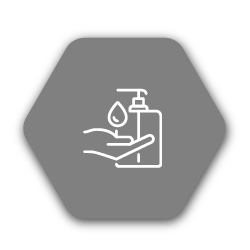Like all business ventures, running a Warehouse and Distribution (W&D) line has its risks. These risks increase exponentially if you consider the world is battling COVID-19. Maintaining one during this pandemic requires diligent planning, detailed execution, and intentionality in ensuring that all parties involved in the chain distribution – from warehouse staff to clients undergoing isolation at home – are insured from any danger to their health.
A quick search on the internet would reveal basic tips to keeping yourself safe as an individual, and the need to stay at home, preventing the spread of the virus. For a W&D business, though, the story is quite different, transcending the health of one single man to the safety of a business.
With the Coronavirus having been shown to live on surfaces for eight hours or more, a package delivered at the doorstep of an apartment could easily transmit the virus from one person to another.
Fortunately, there are several steps between the ordering of a product online to the delivery. And keeping goods free of the virus in the warehouse is a guaranteed way you can stake a claim in ensuring products are healthy for your consumers. But how can you protect your goods in your warehouse against coronavirus?
Below are a few tips.

1. Reduce the work hours of your warehouse staff
It is a matter of necessity now to ensure employees working in your warehouse are in a healthy mental shape all through their time at work. Mental exhaustion carries a tendency to disrupt their hygiene consciousness, and considering that many workers are now fulfilling their office demands from home, asking your warehouse employees to maintain their regular schedule could result in fatigue and tiredness. That could lower their concerns about staying clean during this period.
One way to tackle extended work hours – factoring increased demands as more people sit at home – is to rethink shifts. Warehouse staff can be placed in shifts of not more than eight hours per day, with occasional breaks slipped in between. While you might want to encourage double shifts, be mindful of the risks. While the world struggles with the Coronavirus pandemic, there are higher risks involved in working for such an extended period. And you must highlight them, and let anyone who chooses to commit their body and mind know of the danger.
Generally, employees who work for longer hours show a tendency to be more casual about what goes on in their body, or around their workplace, than those who work for shorter, more consistent hours.

2. Disinfect and sanitise well-frequented areas in your warehouse
Across the world, business owners are finding solace in disinfecting their zones before and after work hours. US retail stores such as Kroger and Publix have even altered their work hours so they can clean their stores more regularly.
Public places such as bus stops and malls are facing routine disinfecting, especially in locations where a complete shutdown of all commercial activities could lead to economic paralysis.
The use of disinfectants in the warehouse is one that is sure to work, but you must be careful to make use of a trusted brand of disinfectant as you do not want the odour of the disinfectant lingering on products and packages long after the warehouse has been cleaned. It is advised that owners consider the nature of products in the warehouse, their general durability, and the resistance to humidity, smell, before concluding on a one-sweep disinfecting.
The sanitisation of those who work in different sections in the warehouse is also essential.
Guidelines provided by the Centers for Disease Control and Prevention (CDC) on protecting yourself should be emphasised amidst warehouse staff, hand sanitisers and gloves readily provided to curb contact between hands and surfaces. Sensitisation on the various ways the virus can be spread as suggested in the guidelines comes in handy, and staff should be encouraged to practice open communication with co-workers and family members.

3. Show strong leadership through transparency
Should any of the warehouse staff test positive for Coronavirus, notifying all others of the development serves to favour the business in a long-term scenario.
Given the increasing concerns of the government over the safety of groceries, food production businesses, and the allegations storming the internet alluding to the idea that business owners are being secretive about updating workers on present situations in the company, bringing all on board is a worthy decision.
Care must be taken to ensure that panic is not spread in the hearts of workers, while simultaneously workers should be admonished to take extra precautions. Your warehouse staff want to feel a sense of safety that the person standing next to them wasn’t in contact with someone who tested positive for coronavirus.
Noting that the number of cases testing positive despite being asymptomatic is on the rise, the guaranteed way to allay workers fear to come clean about who is being tracked or who has tested positive must be done by your managerial team. Employees see this as the leadership taking responsibility for everyone and can help you to preserve any trust that you’ve built.
You only need to consider a retailer such as Pick n Pay in South Africa. Recently, one of its branches announced it had to close because a staff member had tested positive for the Coronavirus. It's during this time that both staff and the public can take heart from the way in which you take action. What's more, acting accordingly and swiftly can help you to strengthen your retail brand.

4. Consider hiring more staff to combat a spike in orders
Consumers who are wary of leaving their homes to shop, now turn to online stores and deliveries. The pressure to meet up with deliveries in real-time can become overwhelming, and with reduced work hours now a considerable plan, hiring more workers is a sure way to combat the spike in orders.
This preserves the rate of work being completed in the warehouse in a single day, which can range from sorting to storing to offloading, and likewise limits the exposure of individual workers to others in a single day.
Increasing the number of workers would also be a crucial factor in ensuring the company puts necessary precautions in place, encouraging safe sanitary practices such as hand washing after a sneeze and cleaning of touch surfaces regularly. Social distancing should also be considered to eliminate unnecessary body contact between workers.
All stakeholders in the warehouse business must note that warehouse conditions should be sanitary as the Coronavirus can survive for longer hours on surfaces commonly found in the warehouse. After all, keeping the goods from exposure doesn’t only benefit them. It also benefits any individual that comes into contact with them.
Conclusion
Just like any part of the supply chain, the warehouse is an integral part of its success and longevity. Fail to implement core health rules and regulations and you'll face consequences that otherwise you might have been able to avoid.


